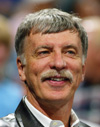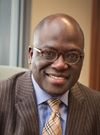
Dan Hesse SPRINT CORP., KANSAS CITY
Dan Hesse works in Kansas, lives in Missouri and leads one of the largest employers in the region as CEO of Sprint Corp. So he has a broader view of the work force here, which he says is friendly, outgoing and has good interpersonal skills. “There is also a real sense of community,” he notes, not something the Wall Street analysts talk about when assessing a company’s stock price. And yet, it does indeed have a bottom-line impact: “Friendliness and good interpersonal skills contribute to the teamwork that large corporations require to be successful,” Hesse says. “The sense of community that our employees have helps Sprint to be recognized as such a strong corporate citizen.”
After joining Sprint in 2007, Hesse moved quickly to address customer-service complaints. Mission accomplished: Last year, recognizing the company’s dramatic strides to reverse that reputation, J.D. Power & Associates presented its award for wireless customer service to Sprint. Instilling that culture of customer service is something that flows from Hesse’s internal drive to do the right thing—an influence from one of his Missouri inspirations: “Harry Truman,” says Hesse, “was a leader who did what he thought was the right thing to do, regardless of whether it was popular or not.”

Stan Kroenke KROENKE SPORTS ENTERPRISES, COLUMBIA
Lamar Hunt turned sports ownership from novelty into industry, but his impact on sports is being rivaled today by another Missouri figure, Stan Kroenke of Columbia, whose American sporting empire stretches from the foothills of the Rocky Mountains to the banks of the Mississippi River. His company, Kroenke Sports Enterprises, has a footprint that covers the St. Louis Rams of the NFL, the NBA’s Denver Nuggets, the Colorado Avalanche of the National Hockey League, Major League Soccer’s Colorado Rapids, and—for those of you who didn’t even know there was a National Lacrosse League—the NLL’s Colorado Mammoth.
Kroenke hasn’t stopped there; he’s also majority owner of the Arsenal Football Club in London, as well as two sporting venues: the Pepsi Center in Denver and Dick’s Sporting Goods Park in Commerce, Colo. Sports, though, wasn’t where he got started: In 1983, this Mizzou grad—he holds three degrees from MU, including his MBA—founded the Kroenke Group, specializing in shopping centers and apartment buildings—efforts that haven’t suffered as a result of his marriage to Ann Walton, whose uncle was Wal-Mart legend Sam Walton.

Benjamin Ola Akande WEBSTER UNIVERSITY, ST. LOUIS
This is why Benjamin Ola Akande, from most every success metric you can think of, elevates both Webster University’s business school and the broader St. Louis area: “Missouri needs to start thinking big ideas, transformational ideas that will move us,” he says. “We need to transform the way business is dealt with—in tourism, food technology, life sciences—and we need to be clear what our competitive advantage is, what we do that nobody else could do, even if they wanted to.” That kind of thinking has driven improvements at Webster’s George Herbert Walker School of Business and Technology, where he’s been dean since 2000. During that time, student enrollments and graduation rates have risen by more than 40 percent within Webster’s largest academic unit. The Walker School is responsible for 63 percent—$136.8 million—of the institution’s $220 million total tuition revenue. A Nigerian by birth, Akande holds two master’s degrees (in public administration and economics) from the University of Oklahoma, where he also earned his doctorate in economics. If Akande were a stockbroker assessing the state, his recommendation would be “Buy!” Its emerging potential in life sciences and entrepreneurship, and its ability to bring top-level students in from around the world—and keep them here—are the transformational elements he says the state needs to leverage.

Kim Anderson UNIVERSITY OF CENTRAL MISSOURI, WARRENSBURG
Kim Anderson left Sedalia nearly 40 years ago to start defying the odds. First, by playing Division I basketball for the Missouri Tigers. Again, by becoming the Big 8 player of the year in 1977. Yet again, making it into the NBA and pro ball in Europe. Now he’s doing it at the University of Central Missouri. Few in his line—college basketball head coach—have managed 10 seasons at the same program. There are reasons for that bond. For one, he’s home—the Warrensburg-Sedalia-Columbia corridor can be driven in 90 minutes. Another, he says, is the genuine nature of people from Missouri, and the insightful leadership of UCM’s president, Chuck Ambrose. Then there’s the imprint left by another basketball coach from Missouri. “Next to my parents,” Anderson says, “Norm Stewart has probably had the most influence on me. As a player, he taught me a lot, and as a coach, he taught me so many things.” Stewart knew Xs and Os, Anderson says, “but the one thing he instilled in me and his players was how to survive: When you get knocked down, how to get back up.” He has a career winning percentage even higher than that of his mentor, and opportunities occasionally arise to return to Division I school. But his life fits right now. He has two sons with his wife of 35 years, Melissa, a native of nearby Lee’s Summit.